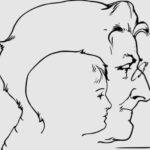Youth Questions
- What is your earliest memory? How old were you and what do you remember?
- How would you describe ‘young you’? (e.g. shy, a bully, playful, serious, happy, nerdy, etc.)
- What are your strongest memories of youth (good and bad)?
(Neighborhood? School? Vacations? Friends? Family? TV Shows?) - What were your favorite toys, games, and forms of play?
- How did you get along with your siblings (or feel about being an only child)?
- Which places, smells, and foods remind you of your youth?
- Have you ever visited ‘the old neighborhood’? How was it?
- What ages were your favorite and least favorite? Why?
- What were the biggest pivots or turning points of your youth?
- Did you ‘get in trouble’ much? What for? How were you punished?
- What are the keys to having a happy, successful youth?
- If you could speak to ‘young you’, what advice would you give?
- In your youth, did you look forward to getting older or did you want to stay young forever?
How about now? - How is ‘being young’ now different from when you were young?
Aging Discussion Questions:
- How do you feel about birthdays or answering ‘How old are you’? Why?
- How old do you feel? In what ways do you feel ‘old’? In what ways do you still feel ‘young’?
- Has GSIT made you feel older or younger?
- What concerns you most about aging? What are you looking forward to?
- Do you/Will you dye your hair when it turns gray? Why or Why not?
- Do you have any special strategies to slow down the aging process (physically and otherwise)?
- When do you want to ‘retire’? What will you do after retirement?
Where do you want to live? How will you enjoy life’s “third act”? - Do you want to live with or near your children when you are older?
- Can you think of people you know who have aged gracefully? and those who have not?
- How have attitudes and behaviors related to aging changed (especially in Korea)?
- Who are some of the elderly people you know? How is their quality of life?
- What advice have older people given you about life, love, health, and money?
- In what ways do you want to age differently from your parents or grandparents?
- How long do you want to live?
- What would you like to be able to say about your life from your deathbed?
Life cycle Vocabulary
- Conception – 임신 (the process of becoming pregnant)
- Pregnancy – 임신 (the state of being pregnant)
- Labor – 분만 (the process of giving birth)
- Preemie – 조산아 (a baby born before the 37th week of pregnancy)
- Newborn – 신생아 (a baby that is recently born)
- Infant – 유아 (a child between 0-1 year old)
- Toddler – 유아 (a child between 1-3 years old)
- Tween – 사춘기 (a child between 9-12 years old)
- Puberty – 사춘기 (the period of sexual maturation)
- Adolescence – 청소년기 (the period between childhood and adulthood)
- Middle age – 중년 (the period between early adulthood and old age)
- Menopause – 폐경 (the cessation of menstruation)
- Senior citizen – 노인 (an elderly person, typically over 60 years old)
- Elderly – 노년의 (relating to or characteristic of old age toward the end life)
- Geriatric – 노인의 (relating to the medical care of elderly people)
- Assisted Living – 요양원 (a facility for elderly or disabled people who require assistance with daily living)
- Nursing Home – 요양원 (a residential facility for elderly people who require medical care)
- Hospice – 입원 위안 병원 (a facility for terminally ill patients)
- Old age – 노년 (the period of life after middle age)
- Grave – 무덤 (a place where a dead body is buried)
- Tomb – 묘 (a grave or vault, typically for a dead person of importance)
- Gravestone – 묘비 (a stone marker placed at a grave to identify the buried person)
- Epitaph – 묘비 문구 (a phrase or statement written in memory of a deceased person)
- Inherit – 상속하다 (to receive money, property, or a title as an heir at the death of the previous holder)
- Bequeath – 유증하다 (to leave property or money to someone in a will)
- Legacy – 유산 (the long-lasting impact of a person’s life.)
Common collocations relating to age
-
- Baby bump – 임신 볼이 (the visible protrusion of a woman’s abdomen due to pregnancy)
- Terrible twos – 어린이 악화 (a difficult stage of child development around the age of two, characterized by tantrums and defiance)
- Growing pains – 성장통 (physical discomfort experienced during growth spurts)
- Disaffected youth – 사회에 불만족한 젊은이 (young people who feel disconnected or disillusioned with society)
- Rebellious phase – 반항기 (a period of defiance and resistance often experienced during adolescence)
- Juvenile delinquent – 미성년 범죄자 (a young person who has committed a crime)
- Identity crisis – 정체성 위기 (a period of uncertainty and confusion in a person’s identity)
- Postpartum depression – 출산 후 우울증 (a type of depression that can occur after childbirth)
- Empty nest – 빈 둥지 (the feeling of sadness or loneliness that parents may experience when their children leave home)
- Midlife crisis – 중년 위기 (a period of insecurity and self-doubt that can occur in middle-aged individuals)
- Age gracefully – 우아하게 늙다 (to age in a positive and dignified manner)
- Senior moment – 노년기의 잊혀짐 (a momentary lapse in memory or judgment associated with aging)
- Retirement blues – 은퇴 슬픔 (feelings of sadness, loss, or depression that some people experience upon retirement)
- Golden years – 황금시대 (the period of life after retirement, typically characterized by leisure and travel)
- Graying population – 노인 인구 (a demographic trend in which the proportion of older people in a population is increasing)
- Deathbed confession – 죽음의 침대 고백 (a confession or admission made by a dying person)
- End-of-life care – 죽음 앞 치료 (medical care provided to terminally ill patients in the final stages of their lives)
- Legacy building – 유산 구축 (the act of creating a lasting impact or contribution for future generations)
Idioms
- Born with a silver spoon in your mouth – 은수저로 태어난 (to be born into a wealthy or privileged family)
- Example: He never had to work a day in his life, he was born with a silver spoon in his mouth.
- Turn over a new leaf – 새로운 삶을 시작하다 (to start anew or make a fresh start)
- Example: After losing his job, he decided to turn over a new leaf and go back to school.
- The apple doesn’t fall far from the tree – 사과는 나무에서 떨어지지 않는다 (children often share traits or characteristics with their parents)
- Example: Sarah is just as stubborn as her mother, the apple doesn’t fall far from the tree.
- Kick the bucket – 죽다 (to die)
- Example: I can’t believe he kicked the bucket, we just saw him yesterday.
- Youth is wasted on the young – 젊음은 어린이에게 낭비된다 (young people don’t fully appreciate their youth)
Example: If only I knew then what I know now, youth is wasted on the young. - Over the hill – 나이가 들어서 능력이 떨어졌다 (to be past one’s prime)
- Example: I can’t believe I’m turning 40, I feel like I’m over the hill.
- Like father, like son – 아버지 닮아 아들 나타난다 (sons often resemble their fathers in appearance or behavior) “Like mother, like daughter” can also be used, but is less common.
- Example: John is just as stubborn as his father, like father, like son.
- A chip off the old block – 아버지 닮은 것 같다 (a child who strongly resembles one or both of their parents)
- Example: She’s just like her mother, a chip off the old block.
- The circle of life – 생명의 순환 (the natural cycle of birth, growth, and death)
- Example: Everything has a beginning and an end, it’s all part of the circle of life.
- Back in my day – 나 어렸을 적엔 (a phrase used to refer to a time in the past when the speaker was young)
- Example: Back in my day, we had to walk to school in the snow, uphill both ways.
Quotes
You can’t help getting older, but you don’t have to get old.
George Burns
“Some day you will be old enough to start reading fairy tales again.”
“Wrinkles should merely indicate where the smiles have been.”
“Youth can not know how age thinks and feels. But old men are guilty if they forget what it was to be young.”
― J.K. Rowling, Harry Potter and the Order of the Phoenix
“No book is really worth reading at the age of ten which is not equally – and often far more – worth reading at the age of fifty and beyond.”
“The older I grow, the more I distrust the familiar doctrine that age brings wisdom.”
“My grandmother started walking five miles a day when she was sixty. She’s ninety-seven now, and we don’t know where the heck she is.”
“I do not think, sir, you have any right to command me, merely because you are older than I, or because you have seen more of the world than I have; your claim to superiority depends on the use you have made of your time and experience.”
“No, that is the great fallacy: the wisdom of old men. They do not grow wise. They grow careful.”
― Ernest Hemingway, A Farewell to Arms
“Just remember, when you’re over the hill, you begin to pick up speed.”
“At 50, everyone has the face he deserves.”
“In my dreams, I never have an age.”
“You get old and you realize there are no answers, just stories.”
― Garrison Keillor, Pontoon: A Novel of Lake Wobegon
“Age isn’t how old you are but how old you feel.”
― Gabriel García Márquez, Memories of My Melancholy Whores
“Age is an issue of mind over matter. If you don’t mind, it doesn’t matter.”
“Old age ain’t no place for sissies.”
“Youthfulness is about how you live not when you were born.”
“It’s never too late to have a happy childhood.”
― Tom Robbins, Still Life with Woodpecker
“It takes a very long time to become young.”
“If you’re not getting happier as you get older, then you’re f***in’’ up”
“Young men speak about the future because they have no past, and old men speak of the past because they have no future.”
“You have to find what’s good and true and beautiful in your life as it is now. Looking back makes you competitive. And, age is not a competitive issue.”
― Mitch Albom, Tuesdays with Morrie
“It is a bad idea to live too long. Few carry it off well.”
― Charles Frazier, Thirteen Moons
Forty is the old age of youth, fifty is the youth of old age.
Hosea Ballou
It is not how old you are, but how you are old.
Jules Renard
To find joy in work is to discover the fountain of youth.
Pearl S. Buck
The duty of youth is to challenge corruption.
Kurt Cobain
Youth is a blunder; Manhood a struggle, Old Age a regret.
Benjamin Disraeli
“You know you’re old when you’re watching Karate Kid and you realize you’re more attracted to Mr. Miagi than Ralph Macchio.”
“What can ever equal the memory of being young together?”
― Michael Stein, In the Age of Love
“Youth is happy because it has the capacity to see beauty. Anyone who keeps the ability to see beauty never grows old.”
“Youth is wasted on the young.”
“Youth ends when egotism does; maturity begins when one lives for others.”
Visits: 402






Leave a Reply